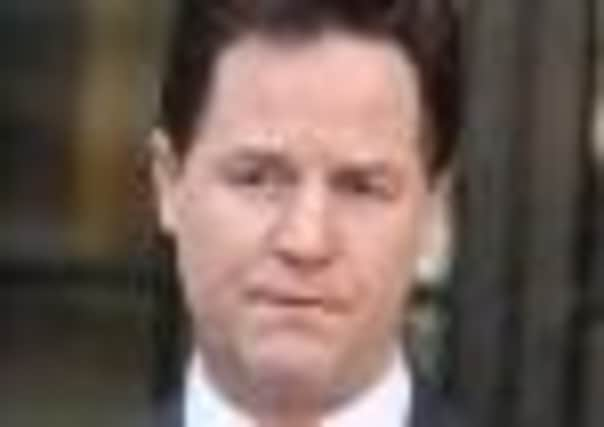‘Brain drain’ fear unites MPs against regional pay


The Deputy Prime Minister moved to pour cold water on the Chancellor George Osborne’s controversial proposals to tear up national pay bargaining yesterday, insisting “nothing has been decided” and warning that long-term pay freezes in lower-paid areas would be “totally unjust”.
“I feel very strongly as an MP from South Yorkshire, which has a lot of people in public services, that we’re not going to do anything that will simply willy-nilly exacerbate a North/South divide,” the Sheffield Hallam MP said.
Advertisement
Hide AdAdvertisement
Hide AdHis words come amidst mounting concern across the North that the policy will see pay for nurses, teachers and civil servants held down for years in lower-wage areas such as Hull, Doncaster and North Yorkshire, making it even harder to attract top-quality staff and sparking a “brain drain” towards higher-wage areas.
Labour politicians and unions have already made clear their opposition to the proposal, which was first outlined by the Chancellor last year and pushed forward in his Budget speech in March.
Now backbench Conservatives and non-partisan council bosses are making their concerns clear.
Yesterday, the chief executive of one of the country’s largest local authorities, Tom Riordan of Leeds City Council, told the Yorkshire Post: “I do not support the idea of regional pay, for two reasons.
Advertisement
Hide AdAdvertisement
Hide Ad“First, public sector workers in the North are already having to provide services that have been cut whilst enduring a pay freeze.
“Second, it will take purchasing power directly out of the local economy and further exacerbate the North/South divide.”
Mr Osborne believes high levels of public sector pay in low-wage areas are stifling private businesses by making it difficult for them to compete for employees.
But concerns are growing on his own backbenches about the impact on areas such as East Yorkshire, where public bodies already struggle to attract the best staff.
Advertisement
Hide AdAdvertisement
Hide AdBrigg and Goole’s Conservative MP Andrew Percy said: “The Government need to proceed extremely carefully on regional pay.
“In the Humber, we have struggled to attract people into teaching. When I was a local councillor in Hull, we had to come up with the so-called ‘Hull offer’, whereby we had to pay people more to come and teach in local schools.
“A few weeks ago at a meeting with our local hospital trust, we were told the trust was unable to attract doctors and would possibly have to consider paying more as a consequence. There is undoubtedly an issue with pay in the south-east of England, but it would be morally wrong to take money from public sector workers in the north of England to solve a problem that exists in the south.”
Martin Vickers, the Conservative MP for Cleethorpes, said he shared Mr Percy’s concerns.
Advertisement
Hide AdAdvertisement
Hide Ad“I was a councillor for many years in Lincolnshire and we found it very difficult attracting specialist staff,” he said.
“Even though these areas have low wages and a low cost of living, you have to pay a premium.”
Previously unions have warned of widescale pay freezes as the only way the Government could close the gap between public and private sector pay in many areas.
Mr Clegg yesterday dismissed such “scaremongering” but made clear he would not accept “unjust” pay deals.
Advertisement
Hide AdAdvertisement
Hide Ad“I really feel there has been some ludicrous scaremongering, particularly from trade unions, when there is no proposal on the table at all,” he said.
“But I do think it’s important people should be reassured that we’re just not going to rush head-long imposing a system from above which, if it was done in the way it has been described, would be totally unjust, and would actually penalise people who work in some of the most difficult areas.”
Nonetheless, the policy is gathering pace. The Treasury has asked the independent Pay Review Bodies “to consider how public sector pay could be made more responsive to local labour markets”, with a report due back this summer.
A Treasury spokeswoman said: “This is about supporting economic growth and the quality of public services across the UK by ensuring that wages are set at the right level in each location.
Advertisement
Hide AdAdvertisement
Hide Ad“There are significant disparities between public and private sector pay in different areas, with public sector premiums as high as 18 per cent in some locations.
“This variation has the potential to hurt private sector businesses who have to compete with higher public sector wages.”